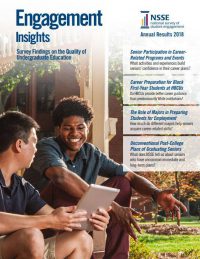Millennials expect many job changes, are more open to self-employment as part of the "gig economy" and want flexible hours and professional development opportunities (Gianniris, 2018). With most of today's graduating college students being millennials, a natural question is how their immediate and long-term career plans align with this supposed pattern. Using data from over 35,000 seniors at 145 institutions, NSSE's Senior Transitions Topical Module illuminates some of these trends.
A majority of seniors had conventional post-college plans, with about two-thirds planning on full- or part-time employment and another 21% planning to attend graduate school. However, a nontrivial percentage (11%) had what we characterized as unconventional plans, including service or volunteer activity (1%), an internship (4%), a travel or gap year (3%), or other plans (2%).
In addition to considering immediate plans, we also explored some of their long-term plans. The module includes questions about plans to someday (a) be self-employed, an independent contractor, or a freelance worker; and (b) start a business (nonprofit or for-profit). About one-quarter (28%) of seniors had at least one of these long-term plans.
Are there relationships between these plans and student engagement? Not surprisingly, there was variation by major field for both immediate and long-term plans. However, there were some notable differences in terms of engagement and high-impact practice participation, even when controlling for other demographic and institutional factors. For instance, those more engaged in Reflective & Integrative Learning were more likely to have unconventional immediate plans, while Higher-Order Learning was inversely related. Additionally, seniors who had participated in service-learning and learning communities were more likely to have unconventional long-term plans, while the opposite was true for those who had done research with faculty.
See more details about this study and results from the 2018 administration of NSSE here.
Annual Results--Director's Cut!
Not everything can be included in a publication as brief as the NSSE Annual Results. Here are some findings that didn't make the final cut!
Conventional Plans & Preparation
There were varying levels of preparation among those with conventional plans. Students planning on full- or part-time employment were also asked if they already had a job lined up. Not surprisingly, those with new jobs felt more prepared for their plans. Over three-quarters (76%) believed their major prepared them well ("Quite a bit" or "Very much") for post-college plans, compared to 67% of those without jobs or no plans at the time and 69% of those who planned to stay in their current jobs. Similarly, those with new jobs more frequently talked with faculty about their plans, with 59% who did this frequently ("Very often" or "Often"). This compares to 47% of those without jobs or no plans at the time, and 37% of those who will stay in their current jobs. Some of the variation can be explained by major, but not all. For example, engineering majors were the most likely to have a new job lined up, but were among the least likely to talk with faculty about career plans.
Gianniris, D. (2018, January 25). The Millennial arrival and the evolution of the modern workplace. Forbes. Retrieved from https://www.forbes.com


